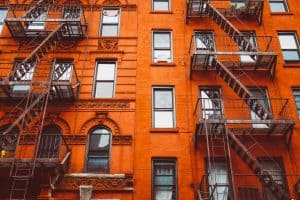The city is about to deal another blow to already-squeezed NYC landlords

De Blasio sure knows how to keep his hand in the pockets of landlords when it comes to raising property taxes. But a fourth rent freeze in eight years will thrust landlords and their aging housing stock into a downward spiral of deferred maintenance and upgrades.
The RGB has a mandate to balance the needs of tenants and landlords. But balance may as well be a four-letter word, as de Blasio from the start made sure his RGB implemented politically motivated rent freezes and historically inadequate increases, each year tainting this supposedly impartial process.
For years, his administration spewed rhetoric about preserving the city’s rent-stabilized housing stock. Yet in practice, it took steps to choke off the operating revenue of the biggest providers of affordable housing. The RGB approved rent-guideline increases averaged 0.75 percent over the past seven years, while operating expenses, on average, increased 3.6 percent during the same period; property taxes alone rose by an average of 6 percent.
After the state Legislature passed the anti-landlord Housing Stability and Tenant Protection Act of 2019, some city officials expressed concern that the new laws might have gone too far. They urged the RGB to implement rent increases, to allow landlords to properly maintain their rent-stabilized apartments. The RGB ignored those concerns, and then came the pandemic.
The HSTPA has prevented building owners from properly reinvesting and doing the necessary building and apartment upgrades. Rainy day reserves are depleted, and zero relief has been provided to landlords during the COVID outbreak. But don’t blame the pandemic. Rent freezes and rent increases averaging less than 1 percent have cemented de Blasio’s miserable legacy of failure in preserving affordable housing.
The RGB’s recent Income and Expense study, which doesn’t reflect the full impact of the HSTPA and the pandemic, shows that the number of distressed buildings had already increased in 2019, that is, pre-pandemic. And the highest share of those buildings represent prewar construction, a clear indication that poor policy choices had endangered the city’s oldest affordable-housing stock before anyone had heard of the coronavirus.
Landlords are still required to pay their city property taxes, mortgages, heating fuel and other expenses, and it costs money to repair, maintain and operate their buildings. Yet they can’t collect. This, even as thousands of tenants, including those who never lost their jobs or collected enhanced unemployment benefits, aren’t paying, not because they can’t afford their rent, but because the eviction moratorium says there are no consequences for not paying rent.
Meanwhile, in addition to a 16-month eviction moratorium, any tenant financially impacted by the pandemic is on the verge of getting up to 12 months of rent arrears — this on top of $11,400 in stimulus payments for a family of four regardless of employment status and other generous financial assistance from the feds.
RGB members wouldn’t impose a rent freeze if they viewed the figures objectively. Indeed, even in a hypothetical, non-pandemic world, the RGB’s own data would have called for a rent increase last year. But despite increased operating expenses and, for the first time in two decades, a decrease in building revenue, the RGB played pandemic politics with a rent freeze.
Landlords are fully aware of the pandemic’s economic impact on families; they’ve experienced the same struggles personally and as small business owners; they sympathize. Yet de Blasio’s RGB, when it takes its final vote on June 23, will make rent-stabilized housing providers the scapegoat for economic conditions caused by a global health crisis and the political class’ own policy failures. Why blame the pandemic or themselves when they can blame landlords? For progressives like de Blasio, it’s easier to point the finger than to take the blame for a housing disaster he created long before the pandemic.
Source: nypost.com















 Accessibility
Accessibility